This is my best attempt towards putting together a complete list of common digestive conditions to help with your research.
Why? Because your doctor telling you, “It’s just IBS” is just BS.
What is IBS?
IBS stands for Irritable Bowel Syndrome.
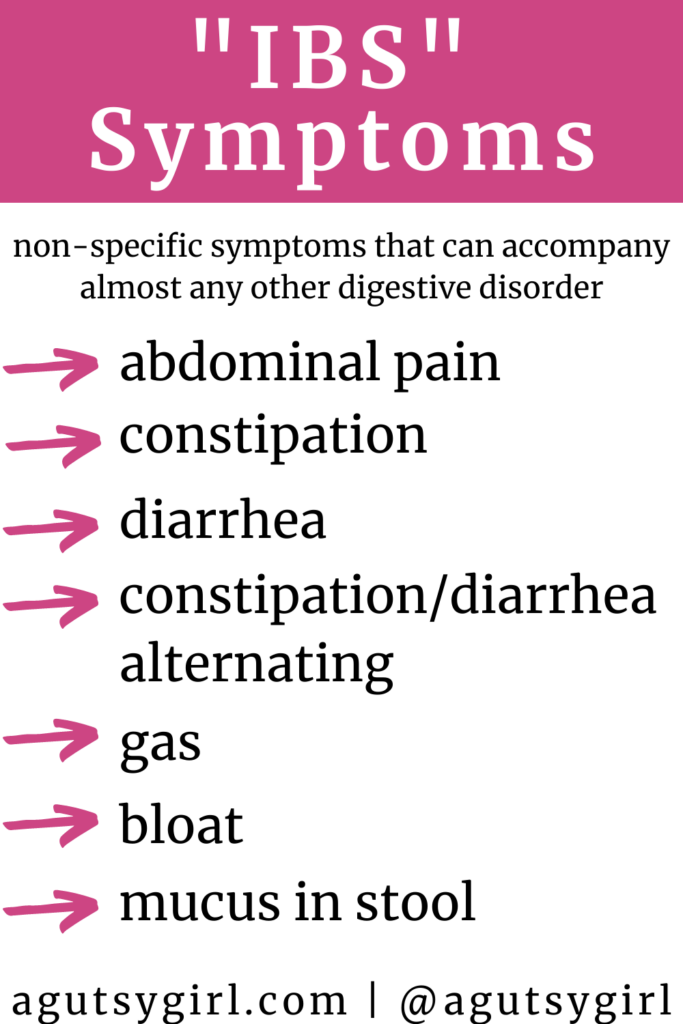
This is not the same, in any way, shape, or form as IBD which stands for Inflammatory Bowel Disease.
IBS is known as “spastic colon.” Since it’s a syndrome it’s just a set or range of symptoms that may fall into the defining category, Irritable Bowel Syndrome.
IBS, unlike IBD, does not cause tissue inflammation.
In other words, if you were to be ‘scoped,’ doctors would not find tissue inflammation, scarring, etc. from IBS alone.
The problem with an IBS diagnosis (which is why I call BS on it all the time) is that IBS symptoms are non-specific.
Here they are:
- abdominal pain
- constipation
- diarrhea
- both constipation and diarrhea, alternating
- gas
- bloat
- mucus in stool
What I mean by “non-specific” is that each and every single one of those symptoms can, and almost always do, accompany many of the common digestive conditions below.
If you go into your doctor with those symptoms and s/he asks no further questions and does no further testing, they usually leave you with a bottle of MiraLax and IBS diagnosis.
Don’t believe me?
Happened to me for years, it’s happened to many of you, and it happened to one of the men I love most in my life – my dad (who ultimately would end up losing his battle with Colon Cancer).
So please, if you are reading this and believe that IBS is always accurate, consider something else, too.
Complete List of Common Digestive Conditions
Click HERE to save this post for later.
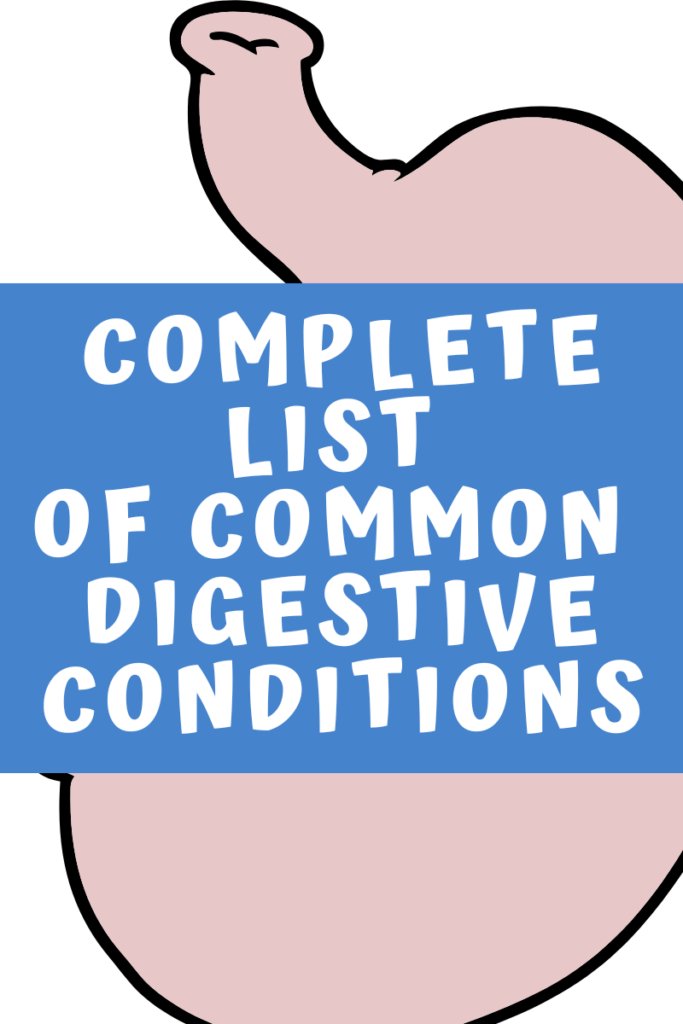
You must make note that I specified “common.” This is very important because the list of digestive conditions is insanely long, complex, and detailed.
If you want to see an even longer list from a government source, check out THIS.
And if you want to see the Internet’s longest list, see THIS list from eMedicine.
The second list would take you hours to peruse, and it breaks down every last digestive condition possible.
Today I’m keeping it (mostly) simple, though many of the common conditions below aren’t actually that common.
Common-ish didn’t seem right. So just run with it for a second, okay?!
24 Common Digestive Conditions
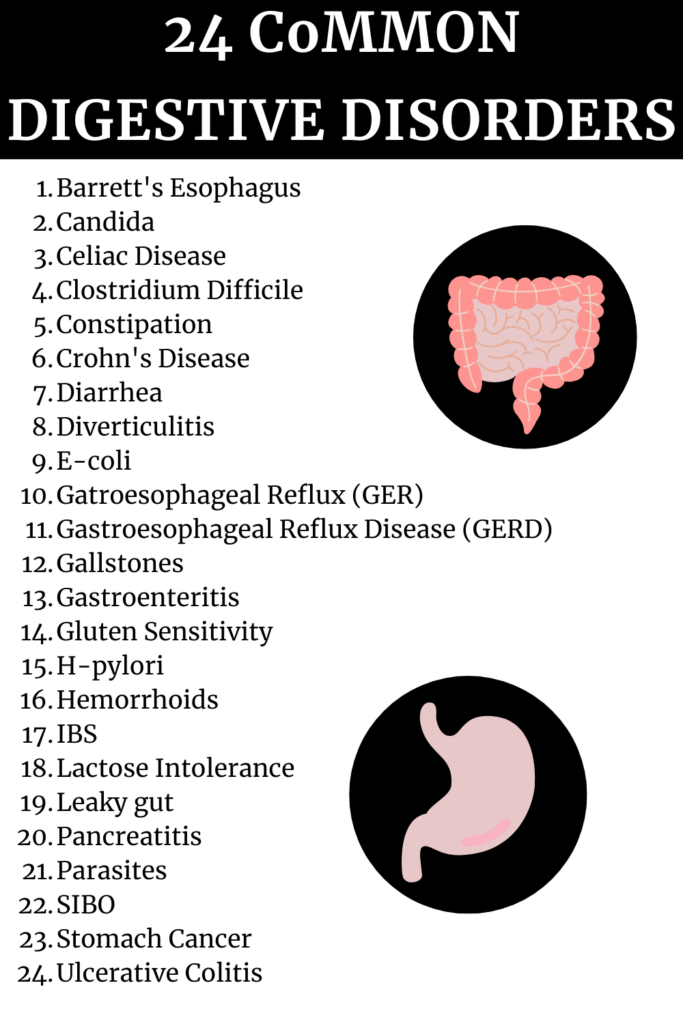
Barrett’s Esophagus
Barrett’s esophagus is often diagnosed in people who have long-term gastroesophageal reflux disease (GERD).
Only a small percentage of people with GERD will develop Barrett’s esophagus, but it’s important because it is associated with an increased risk of developing esophageal cancer.
Candida
Candida is a fungus, which is a form of yeast, a very small amount of which lives in your mouth and intestines. Its job is to aid with digestion and nutrient absorption.
An overproduction of candida breaks down the wall of the intestine and penetrates the bloodstream, releasing toxic byproducts into your body and causing leaky gut.
This can lead to many different health problems ranging from digestive issues to depression.
Learn more:
Celiac Disease
Celiac disease is a serious autoimmune disorder that can occur in genetically predisposed people where the ingestion of gluten leads to damage in the small intestine.
1 in 100 people worldwide (estimated) are affected by Celiac disease.
The only treatment currently for Celiac is adherence to a strict gluten-free diet.
Learn more:
Clostridium Difficile
Many know this by the term C. Diff.
Clostridium difficile is a Gram-positive, spore-forming bacterium.
It is an opportunistic pathogen, infecting the colon of patients following antibiotic treatment.
C. difficile produces two toxins, TcdA and TcdB, which damage intestinal cells and cause inflammation in the gut.
Learn more:
Constipation
I included this one, even though I believe that chronic constipation almost always goes hand-in-hand with something else on this list.
Chronic constipation is infrequent bowel movements or difficult passage of stools that persists for several weeks or longer.
Constipation typically occurs with fewer than three bowel movements a week; it would be a 1-3 on the Bristol Stool Chart.
Learn more:
- Diarrhea vs Constipation {Irritable Bowel Syndrome Patterns}
- Constipation vs Bloating
- Can Constipation Cause Back Pain {+ 5 other things you didn’t know constipation can cause}
- Magnesium, Constipation and Digestion
- 15 Ways to Deal with Constipation
- Probiotics for Constipation
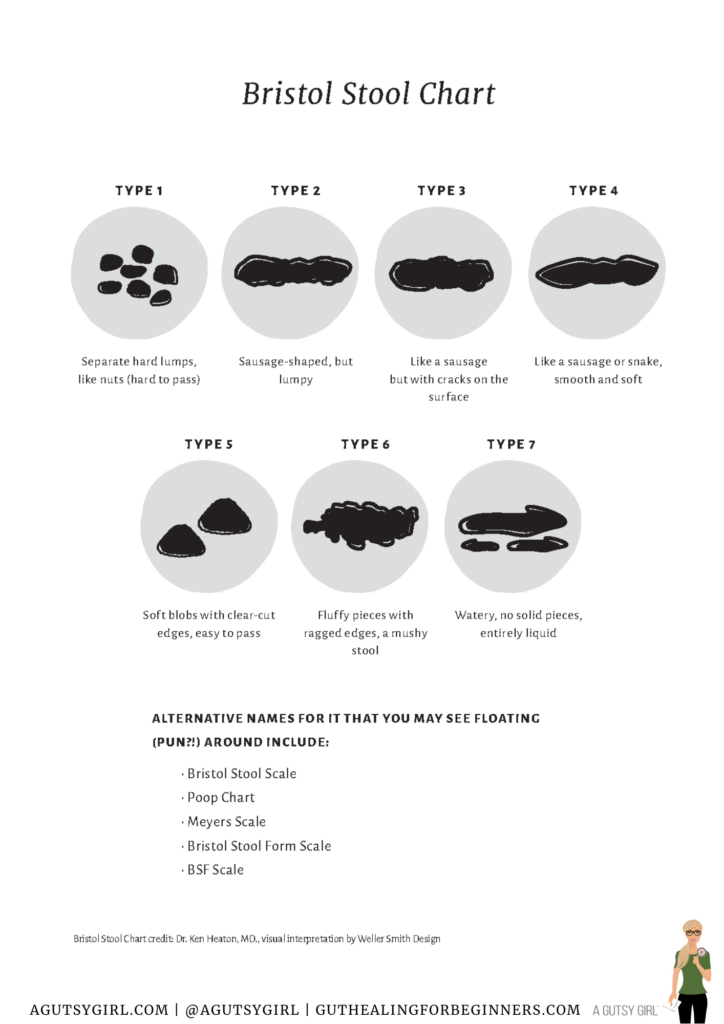
Crohn’s Disease
There are different types of Crohn’s Disease that affect different areas of the GI tract.
The most common form of Crohn’s, ileocolitis affects the end of the small intestine (the ileum) and the large intestine (the colon).
Symptoms include diarrhea and cramping or pain in the right lower part or middle of the abdomen.
This type is often accompanied by significant weight loss.
Learn more:
Diarrhea
Opposite of constipation is diarrhea.
In most cases, diarrhea lasts a couple of days.
But when diarrhea lasts for weeks, it can indicate a serious disorder, such as a persistent infection, inflammatory bowel disease, or a less serious condition, such as irritable bowel syndrome.
Going back to the Bristol Stool Chart, diarrhea would be in the range of a 5-7 (mostly a “7”).
Learn more:
- Diarrhea vs Constipation {Irritable Bowel Syndrome Patterns}
- Can Stress Cause Diarrhea (Episode 28 with Isabel Smith)
Diverticulitis
Diverticula are small, bulging pouches that can form in the lining of your digestive system.
You’ll find them most often in the lower part of the large intestine (colon).
When one or more of the pouches become inflamed or infected, it is known as diverticulitis which can cause severe pain, fever, nausea and a marked change in your bowel habits.
Learn more:
Escherichia Coli
Escherichia coli (E. coli) bacteria normally live in the intestines of healthy people and animals.
Most varieties of E. coli are harmless or cause relatively brief diarrhea.
But a few particularly nasty strains, such as E. coli O157:H7, can cause severe abdominal cramps, bloody diarrhea and vomiting.
Gastroesophageal Reflux (GER) + Gastroesophageal Reflux Disease (GERD)
Gastroesophageal reflux (GER) happens when your stomach contents come back up into your esophagus causing heartburn (also called acid reflux).
It is a long-lasting and more serious form of GER.
Learn more:
- Acid Reflux vs Gastritis {Episode 42 with Jade Etter}
- Can Acid Reflux Cause Sinus Problems {+ 4 more gut-sinus connections}
- All About Acid Reflux
Gallstones
Gallstones are stones or lumps that develop in the gallbladder or bile duct when certain substances harden.
There are approximately 20 million Americans with gallstones.
Learn more:
Gastroenteritis (Stomach Flu)
Gastroenteritis is an inflammation of the gastrointestinal tract (the pathway responsible for digestion that includes the mouth, esophagus, stomach, and intestines).
You may have heard “stomach flu,” even though it may not be related to influenza.
Gluten Sensitivity
Your blood test for celiac disease came back negative, but you still don’t feel well.
Now what?
If you have been suffering from symptoms that seem related to gluten, it may be possible that you have non-celiac gluten sensitivity (‘gluten sensitivity’).
Research estimates that 18 million Americans have gluten sensitivity.
That’s 6 times the amount of Americans who have celiac disease.
Learn more:
Helicobacter pylori
Helicobacter pylori (aka H. pylori) is a bacteria that has been around for at least two hundred thousand years.
If you have this infection, you’re actually most likely not to have any symptoms.
But, having this bacteria living in your body can make your risk of developing gastric cancer up to six times higher.
Plus, H. pylori bacteria is often at the root of other major digestive problems, like peptic ulcers and gastritis.
So, not only can H. pylori cause stomach ulcers, it can also cause ulcers in your esophagus or small intestine.
Learn more:
Hemorrhoids
Hemorrhoids are usually caused by increased pressure due to pregnancy, being overweight, or straining during bowel movements.
By midlife, hemorrhoids often become an ongoing complaint.
By age 50, about half the population has experienced one or more of the classic symptoms, which include rectal pain, itching, bleeding, and possibly prolapse (hemorrhoids that protrude through the anal canal).
Although hemorrhoids are rarely dangerous, they can be a recurrent and painful intrusion.
Irritable Bowel Syndrome
Number 16.
Ah. there you are.
You are so famous – you show up every single day in hospitals all across the world.
Sometimes having you present is legit; usually not.
See above to learn all about Irritable Bowel Syndrome (i.e. IBS).
Lactose Intolerance
Lactose intolerance can cause various symptoms, including bloating, diarrhea and abdominal cramps.
It is the body’s inability to digest lactose, the main carbohydrate in dairy products.
People with lactose intolerance don’t make enough of the enzyme lactase, which is needed to digest lactose.
Dairy is one tricky devil, though.
Grab my list of 100 Dairy Sources and Alternate Names.
Learn more:
Leaky Gut
I am the author of a book on leaky gut called, “The Leaky Gut Meal Plan: 4 weeks to detox and improve digestive health.“
So yes, I know a thing or two about the condition.
Here are a ton of resources to get you started:
- Grab a copy of the book HERE
- 31 Specific Things to Heal a Leaky Gut
- 3 Ways to Know Your Leaky Gut is Healing
- Leaky Gut Causes
- Beef Bone Broth Recipe for Leaky Gut
- Leaky Gut Supplements
- Leaky Gut Diet Recipes
- Best Probiotic Brand for Leaky Gut
- How Long Does it Take to Heal Leaky Gut {Troubleshooting the Diet}
Pancreatitis
Pancreatitis is inflammation of the pancreas.
Acute pancreatitis is short term and may go away in a few days with treatment.
Chronic, or long-lasting, pancreatitis can get worse over time and cause lasting damage.
Parasites
This is not an appetizing picture to paint, but it affects people worldwide, so it should not be overlooked.
A parasite is an organism that lives on or in a host organism and gets its food from or at the expense of its host.
There are three main classes of parasites that can cause disease in humans: protozoa, helminths, and ectoparasites.
Learn more:
SIBO
You already know I’m the SIBO queen, so just click SIBO for all the goods (literally 35 pages full of content on this site where I mention it).
And if you want to skip all of that, just grab Reasonable SIBO.
Stomach Cancer
Stomach cancer should not be confused with other cancers that can occur in the
abdomen, like cancer of the colon (large intestine), liver, pancreas, or small intestine because these cancers can have different symptoms, different outlooks, and different treatments.
All of them can be found HERE.
Stomach Ulcers
Stomach ulcers (gastric ulcers) are open sores that develop on the lining of the stomach.
Ulcers can also occur in part of the intestine just beyond the stomach.
They are duodenal ulcers.
Stomach and duodenal ulcers are sometimes called peptic ulcers.
Ulcerative Colitis
Ulcerative colitis (UL-sur-uh-tiv koe-LIE-tis) is an inflammatory bowel disease (IBD) that causes long-lasting inflammation and ulcers (sores) in your digestive tract.
It affects the innermost lining of your large intestine (colon) and rectum.
Symptoms usually develop over time, rather than suddenly.
Doctors often classify ulcerative colitis according to its location, and the classifications of UC include: Ulcerative proctitis (which is what I “had”), Proctosigmoiditis, left-sided colitis, Pancolitis, and acute severe ulcerative colitis.
Learn more:
- Q&A 5 with A Gutsy Girl {Episode 29: Colitis, GAPS Diet, Healing Mindset, and more}
- A Gutsy Girl’s Story with Severe Ulcerative Colitis
- 21 Things to Do During a Colitis Flare Up
- Healing from Crohn’s and Colitis
- Colitis and Social Situations
- 3 Essential Items for the Colitis Kitchen
Common, Not Normal Digestive Conditions
And this list is just the surface, the more common ones.
Please remember that I said common; I did not say normal.
We need to stop normalizing gut problems.
They are killing us. Literally.
Are there any you’d like to see me go into more detail on? Or any that you would add to the list.
Tell me in the comments below!
So how do you know if you have any of these and/or want to confirm that what you are experiencing is more than just IBS?
It’s like I always say…..you must test, and not guess.
If you’re wondering where and how to get started with testing, grab the Beginner’s Guide to Digestive Health Testing.
Or skip all of that and join Gut Healing: ELEVATED to expedite your healing process.
If you liked this post, you might also enjoy:
Xox,
SKH
🤰 bloating be gone! weight loss through optimal gut health for women
💃ʜᴇᴀʟ ʏᴏᴜʀ ɢᴜᴛ. ʜᴇᴀʟ ʏᴏᴜʀ ʟɪfe.
🫶🏻 founder gutbyome.com





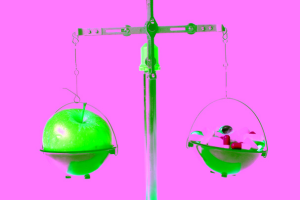

More information on gastritis would be so helpful. Thank you!
Thanks for the thought, Melissa!